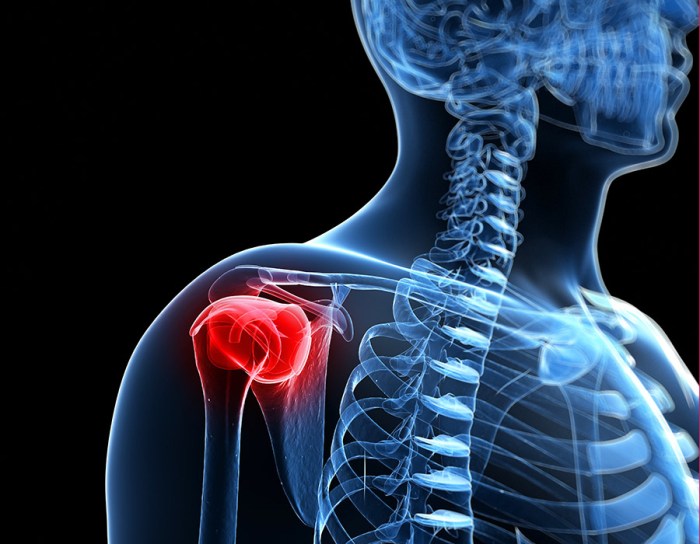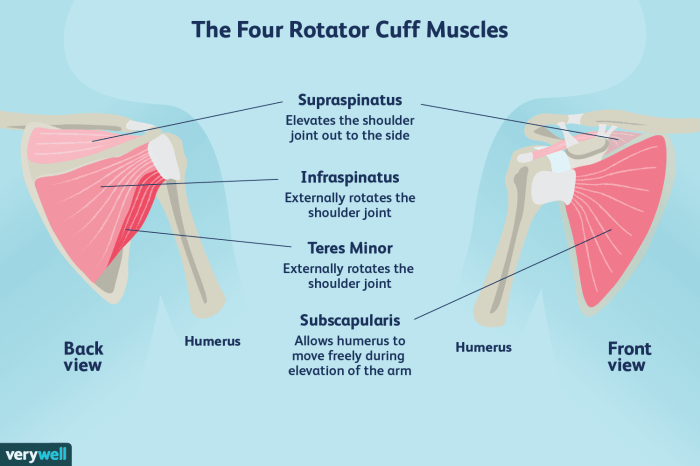Cesar has weak rotator cuff muscles, a condition that affects the muscles surrounding the shoulder joint. This can lead to pain, stiffness, and decreased range of motion. In this article, we will discuss the symptoms, causes, and treatment of weak rotator cuff muscles.
The rotator cuff is a group of four muscles that surround the shoulder joint. These muscles help to stabilize the shoulder, rotate and lift the arm, and allow for a wide range of motion. When the rotator cuff muscles are weak, it can lead to pain, stiffness, and decreased range of motion in the shoulder.
Overview of Weak Rotator Cuff Muscles
The rotator cuff muscles are a group of four muscles that surround the shoulder joint. They work together to provide stability, range of motion, and strength to the shoulder. When these muscles are weak, it can lead to pain, stiffness, and difficulty with everyday activities.
The symptoms of weak rotator cuff muscles can vary depending on the severity of the weakness. Some people may only experience mild discomfort, while others may have severe pain that makes it difficult to lift their arm or reach overhead.
Common symptoms include:
- Pain in the shoulder, especially when lifting or reaching overhead
- Stiffness and reduced range of motion in the shoulder
- Weakness in the shoulder, making it difficult to lift objects or perform overhead activities
- Crepitus (grinding or crackling sensation) in the shoulder
There are a number of factors that can contribute to weak rotator cuff muscles, including:
- Age: The rotator cuff muscles tend to weaken with age as a result of normal wear and tear.
- Overuse: Repetitive overhead activities, such as those performed in sports or occupations that require frequent overhead lifting, can strain the rotator cuff muscles and lead to weakness.
- Trauma: A sudden injury to the shoulder, such as a fall or a direct blow, can damage the rotator cuff muscles and cause weakness.
Weak rotator cuff muscles can have a significant impact on shoulder function. They can make it difficult to perform everyday activities, such as reaching overhead, lifting objects, and combing your hair. In severe cases, weak rotator cuff muscles can lead to disability.
Assessment and Diagnosis of Weak Rotator Cuff Muscles
The diagnosis of weak rotator cuff muscles is based on a physical examination and a review of the patient’s medical history. The physical examination will include a series of tests to assess the range of motion, strength, and stability of the shoulder.
The doctor may also order imaging tests, such as an X-ray or MRI, to confirm the diagnosis.
The differential diagnosis of weak rotator cuff muscles includes a number of other conditions that can cause shoulder pain and weakness, such as:
- Arthritis
- Bursitis
- Tendonitis
- Frozen shoulder
- Labral tear
It is important to rule out these other conditions before making a diagnosis of weak rotator cuff muscles.
Conservative Treatment for Weak Rotator Cuff Muscles: Cesar Has Weak Rotator Cuff Muscles
The treatment for weak rotator cuff muscles depends on the severity of the weakness and the underlying cause. In most cases, conservative treatment is the first line of treatment. Conservative treatment may include:
- Rest: Resting the shoulder can help to reduce pain and inflammation.
- Activity modification: Avoiding activities that aggravate the pain can help to prevent further damage to the rotator cuff muscles.
- Physical therapy: Physical therapy can help to strengthen the rotator cuff muscles and improve range of motion in the shoulder.
- Medications: Over-the-counter pain relievers, such as ibuprofen or acetaminophen, can help to reduce pain and inflammation.
- Injections: In some cases, the doctor may inject corticosteroids into the shoulder to reduce pain and inflammation.
Conservative treatment is usually effective in relieving the symptoms of weak rotator cuff muscles. However, in some cases, surgery may be necessary to repair the damaged muscles.
Surgical Treatment for Weak Rotator Cuff Muscles
Surgery is typically only recommended for patients with severe rotator cuff tears that do not respond to conservative treatment. The goal of surgery is to repair the torn muscles and restore function to the shoulder.
There are a number of different surgical procedures that can be used to repair rotator cuff tears. The type of surgery that is performed will depend on the size and location of the tear.
The risks of rotator cuff surgery include:
- Infection
- Bleeding
- Nerve damage
- Failure of the repair
The benefits of rotator cuff surgery include:
- Relief of pain
- Improved range of motion
- Increased strength
- Return to function
Rehabilitation and Recovery from Rotator Cuff Surgery

After rotator cuff surgery, the patient will need to participate in a rehabilitation program to regain range of motion and strength in the shoulder. Rehabilitation typically begins with passive range of motion exercises, which are performed by a physical therapist.
As the patient progresses, they will begin to perform active range of motion exercises and strengthening exercises.
The recovery time from rotator cuff surgery varies depending on the severity of the tear and the patient’s overall health. Most patients can expect to regain full range of motion and strength within 6 to 12 months after surgery.
Prevention of Weak Rotator Cuff Muscles

There are a number of things that can be done to prevent weak rotator cuff muscles, including:
- Strengthening exercises: Strengthening the rotator cuff muscles can help to prevent them from becoming weak and injured.
- Proper lifting technique: Using proper lifting technique can help to prevent injuries to the rotator cuff muscles.
- Avoiding overuse: Avoiding overuse of the rotator cuff muscles can help to prevent them from becoming weak and injured.
By following these tips, you can help to prevent weak rotator cuff muscles and keep your shoulders healthy.
Frequently Asked Questions
What are the symptoms of weak rotator cuff muscles?
The symptoms of weak rotator cuff muscles can include pain, stiffness, and decreased range of motion in the shoulder. You may also experience weakness when lifting or rotating your arm.
What are the causes of weak rotator cuff muscles?
The causes of weak rotator cuff muscles can include overuse, injury, and aging. Overuse can occur from repetitive overhead motions, such as those involved in sports or work. Injury can occur from a sudden fall or blow to the shoulder.
Aging can also lead to weakened rotator cuff muscles as the tendons and muscles that make up the rotator cuff become weaker over time.
How are weak rotator cuff muscles treated?
Treatment for weak rotator cuff muscles depends on the severity of the condition. In most cases, conservative treatment, such as rest, ice, and physical therapy, can help to improve symptoms. In some cases, surgery may be necessary to repair the damaged rotator cuff muscles.